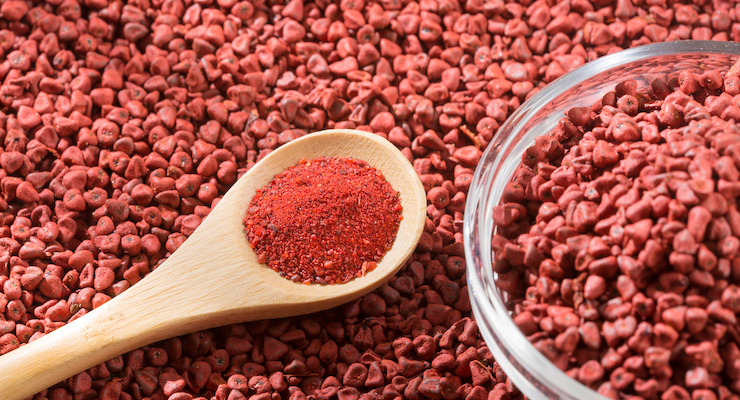Market Updates, Products & Ingredients, Research
Annatto Tocotrienol, Vitamin D & Resveratrol May Offer Blood Sugar Benefits, Reduce Inflammation
Type 2 diabetes patients taking 500 mg/day of delta-tocotrienol for 24 weeks saw improved glycemic control along with reduced inflammation and oxidative stress.

By: Sean Moloughney

Delta-tocotrienol from annatto alone or in combination with other dietary ingredients improved glycemic control and inflammation, according to a clinical study in patients with type 2 diabetes mellitus. Results were published in the Journal of Diabetes and Clinical Studies.
Results of the randomized, double-blind, placebo-controlled trial of the patented DeltaGold annatto-derived tocotrienol ingredient by American River Nutrition, with or without vitamin D3 and resveratrol, indicate significant efficacy on fasting blood glucose, glycated hemoglobin (HbA1c), insulin, HOMA-IR scores, and various inflammation and oxidative stress markers.
In the 24-week study of 120 type 2 diabetes patients, delta-tocotrienol (from DeltaGold)—administered at a dosage of 500 mg/day—was compared to vitamin D3 and resveratrol, all of which led to improved glycemic control accompanied by reduced inflammation and oxidative stress. This study was blinded and compared to a placebo group. In a separate 24-week study of 112 type 2 diabetes patients, a combination of 250 mg delta-tocotrienol, 250 mg resveratrol, and 5,000 IU vitamin D3 were tested against placebo for the same parameters, with similar or slightly improved beneficial results.
Study Details
In the 24-week trial studying individual components, delta-tocotrienol was more effective than vitamin D3 and resveratrol in all parameters measured (except IL-6), and efficiently improved glucose control while reducing inflammation and oxidative stress. HbA1c, a long-term stable measure of blood sugar control, was successfully reduced from 8.4% to 7.8 without change in the placebo group. In addition to improved glucose control, researchers found that inflammation, marked by high-sensitivity C-reactive protein (hs-CRP), was reduced by 12%, while TNF-alpha dropped by 14%. Oxidative stress was also lowered significantly, with biomarker malondialdehyde (MDA) dropping by 11% without change in the placebo group.
Blood sugar management was supported by significant reductions in fasting blood glucose (7%), insulin (9%), and the Homeostatic Model Assessment of Insulin Resistance (HOMA-IR; 14%) for patients taking annatto tocotrienols, while these biomarkers remained largely unchanged in the placebo group.
As a first, this trial showed that of all the groups studied, delta-tocotrienol had the strongest effect on adhesion molecules, reducing markers such as VCAM-1 and ICAM-1 by 55-75%.
A combination of delta-tocotrienol, vitamin D3 and resveratrol, studied in a separate 24-week trial, performed >20% better than delta-tocotrienol alone, improving glycemic control by decreasing HbA1c, HOMA-IR and insulin 10-20%, and lowering inflammation markers by 20-25%.
“The huge amount of data in favor of delta-tocotrienol as well as its combination with vitamin D3 and resveratrol further cements the newly-found glycemic control benefits of the supplement,” said Dr. Barrie Tan, president of American River Nutrition. “What’s new about this study is that it confirms delta-tocotrienol’s superior anti-velcro effect, which had previously only been shown in animal studies. Delta-tocotrienol’s ability to cause a steep reduction in adhesion molecules suggests potential management of atherosclerosis in addition to a tight glycemic control.”


